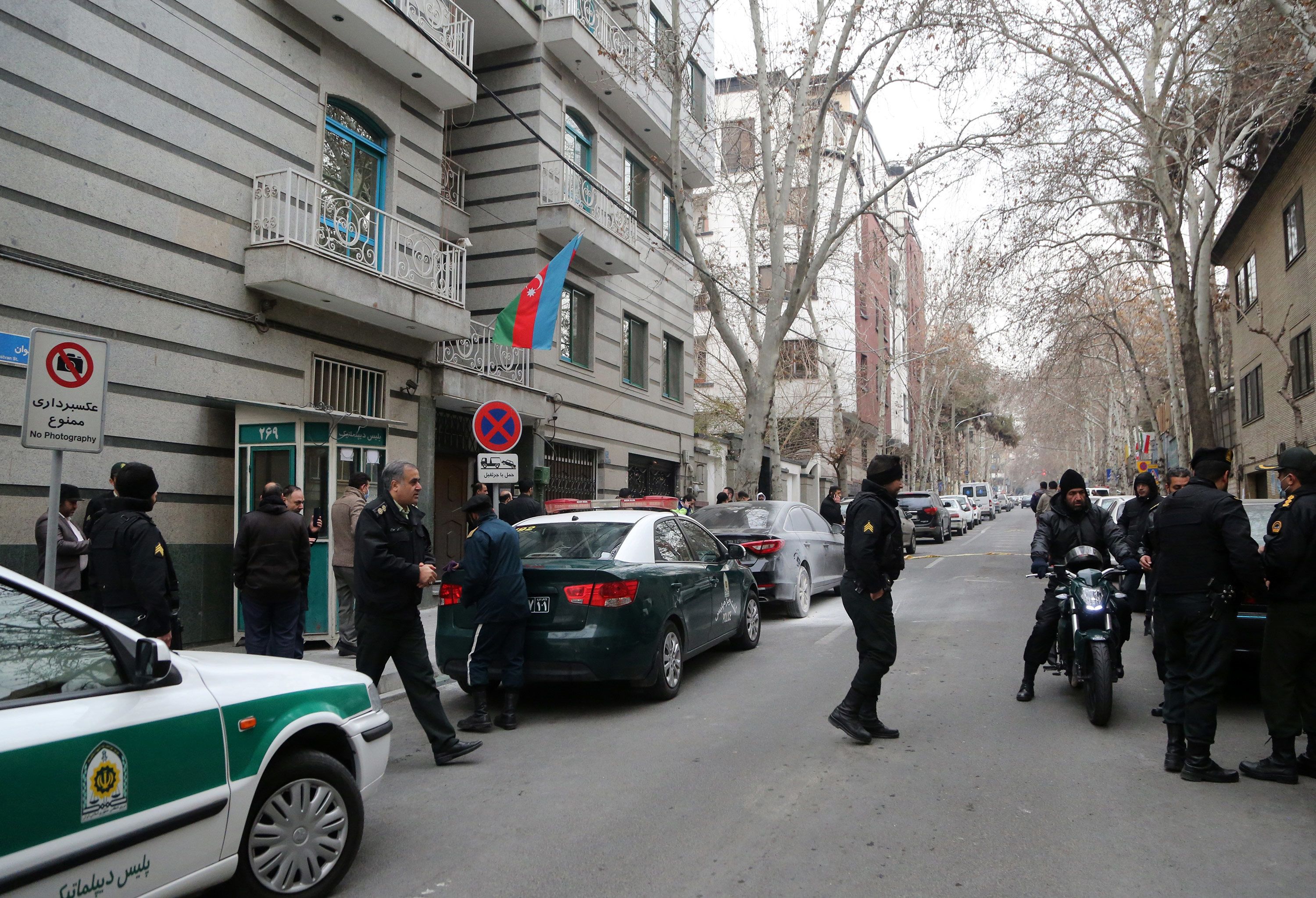Azerbaijan Foreign Minister Jeyhun Bayramov said Baku received an appeal from Iran to restore the work of the Azerbaijani diplomatic mission in Tehran.
“We have received several appeals from the Iranian side in connection with the resumption of the activities of our diplomatic mission,” APA news agency quoted Bayramov as saying on June 5.
“However, of course, these issues are interrelated, and the Azerbaijani side should be absolutely sure that criminals and orderers will be brought to justice and severely punished. All relevant guarantees should be provided to the Azerbaijani side not in words, but in deeds," he added.
"Azerbaijan has expectations regarding the investigation of the terrorist attack committed against the Azerbaijani embassy in Iran in January 2023, and we have openly stated this to the Iranian side," the minister said.
Bayramov added according to the information provided by the Iranian side, the investigation of the criminal case is ongoing, so it is too early to talk about specific results.
“We believe that this event has had a very negative impact on relations between the two countries,” he said.
On January 27, an Iranian national carried out an armed attack on Azerbaijan embassy in Tehran, killing an Azerbaijani security officer and injuring two others.
The gunman, identified as Yasin Hosseinzadeh, was armed with a Kalashnikov rifle when he broke into the embassy building and killed the Azerbaijani officer. He was eventually stopped by the embassy’s security staff after a violent scuffle.
Iran said the attack stemmed from personal reasons, but Baku sees it as an act of terrorism.
Diplomatic activities at the Azerbaijani embassy in Tehran were completely suspended following the incident. However, a few employees remained in the Iranian capital to safeguard the embassy building and properties.
On May 5, Iran declared four Azerbaijani diplomats persona non-grata, including two staff members of the embassy in Tehran and two employees of the consulate in Tabriz. According to Azerbaijani Foreign Ministry’s Spokesperson Aykhan Hajizada, the Iranian decision was a tit-for-tat response to the analogical measure taken by Baku in April this year.
Azerbaijani authorities declared on April 6 four employees of the embassy of the Islamic Republic to Baku Mirmahdi Mirsalampur Sherif, Gurbanali Purmerjan Varjovi, Hadi Moghadam, and Asker Bahari Khosh Menzer persona non grata and gave them 48 hours to leave.
At the time, Baku explained the decision noting activities that were “incompatible with diplomatic status and contradicted the 1961 Vienna Convention on Diplomatic Relations”.
The Iranian authorities have been seen intensifying their bellicose rhetoric against Azerbaijan following the opening of the Azerbaijani embassy in Israel on March 29. During the post-opening press conference in Tel Aviv, Israeli Foreign Minister Eli Cohen said Azerbaijan and Israel share threats caused by Iran, which “creates non-stability in the Middle East by supporting and financing terrorism,” and called for joint action to contain Iran’s nuclear expansion.
Back then, Nasser Kanaani, Spokesperson for the Iranian Foreign Ministry, described the diplomatic mission’s launch as an “anti-Iran stance” and demanded an explanation from Baku.
Referring to the current state of Azerbaijan’s relationship with Iran, Azerbaijani President Ilham Aliyev said on May 3 that the relations between the two countries is at its “lowest level” and the future of their relationship is uncertain.
On June 3, the Ministry of Foreign Affairs of Azerbaijan issued a warning statement for its citizens, urging them not to travel to Iran unless it is necessary and those who are already in Iran to take the utmost precaution and security measures.
The warning came amid the detention of young Azerbaijani citizen Farid Safarli in March 2023, when he travelled to Iran from Germany for personal reasons. Although the Iranian authorities earlier denied having information about Safarli’s whereabouts, on June 1, they confirmed the detention of Safarli, who faced espionage charges.
In turn, Kanaani criticised Azerbaijan's advice to its nationals not to travel to Iran unless necessary, and accused Israel of being behind the decision.
Kanaani wrote on Twitter on June 5 that this was the "same policy" that Israeli President Isaac Herzog pursued during his recent visit to Azerbaijan, adding that it was the "fake, child-killing and occupying Zionist regime" that the "people of Azerbaijan should be scared of, not civilised and Islamic Iran".
The relationship between Baku and Tehran has been deteriorating, largely due to Iran’s activities in the region, including its large-scale military drills near Azerbaijani borders and growing support for Armenia.







 Iran's senior military leaders described the drone and missile attack on Israel on April 14 night as “successful".
Iran's senior military leaders described the drone and missile attack on Israel on April 14 night as “successful".
 The number of evacuees from flooded areas in Kazakhstan has reached 97,852 people, including about 32,856 children since March 27.
The number of evacuees from flooded areas in Kazakhstan has reached 97,852 people, including about 32,856 children since March 27.
 The Kazakh authorities have increased their arbitration claims against international oil companies involved in the development of the Kashagan oil ...
The Kazakh authorities have increased their arbitration claims against international oil companies involved in the development of the Kashagan oil ...



